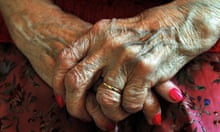The most recent data from Public Health England shows that one in four people living with HIV are over 50, a marked increase from one in eight a decade ago. This is partly due to an increase in the number of older people being diagnosed, but also because people who were diagnosed years ago are now doing well on treatment – if you are found to have HIV today, you can expect to live into your 70s. While care for this group once fell to specialists it is now a concern for generic social care services.
There are many questions about growing old with HIV that remain unanswered for this first generation living with the condition. We don’t yet know the full impact of prolonged HIV treatment and research into how it may interact with other medication is ongoing. There is evidence that people living with HIV are more likely to have the chronic conditions commonly associated with age (cardiovascular disease, arthritis, dementia) at an earlier stage. One study of people over 50 living with HIV found that just under two thirds were on treatment for other long term conditions (pdf), and the number of these conditions was almost double what would have been expected in a similar group from the general population.
But it is not just medical complications that services need to be prepared for. Care providers are experts at putting people at ease, helping them make the sometimes difficult transition from their own homes to residential care or inviting a care worker into their personal space. However, for people living with HIV, there can be additional fears at play. HIV disproportionately affects gay and bisexual men and black African communities in the UK. Research by Stonewall (pdf) shows that some gay and bisexual men are anxious about accessing care, concerned that they may face homophobia or feel obliged to be secretive about their relationships. For black African men and women there are concerns about finding culturally sensitive services, and some have experienced racism. When added to the stigma and discrimination experienced by people living with HIV, it is clear that some preparation is needed if we are to reassure people that care services can meet their needs.
Research by City University found that a third of people living with HIV had faced discrimination, half of these within a healthcare setting. One explanation may be that some people in the health and care sector have not kept up with the fast changing field of HIV. Work carried out by National Aids Trust (NAT) suggests this is often the case. As well as good practice, they have discovered examples of poor care; people refused a bath, given disposable cutlery or even having their HIV status disclosed to everyone, including family and friends. This happens out of a misplaced sense of health and safety or infection control, when of course in reality there is no risk of HIV transmission from the day to day activities of care.
Perhaps it isn’t surprising that some care workers haven’t kept up with the changes around HIV. They aren’t alone. NAT commissioned research from Ipsos Mori looking at public knowledge and attitudes about HIV. When presented with a list of options, less than half of the public can correctly identify all correct routes of transmission, without misidentifying any incorrect routes. Very few people were aware that HIV treatment dramatically reduces the likelihood of someone passing the virus on.
So it isn’t that care providers are particularly ignorant about HIV – they simply reflect a concerning trend across society. This is why it is particularly important that they have the information needed to offer appropriate services for people living with HIV. NAT have developed a guide, with input from Skills for Care, SCIE, Care Inspectorate Scotland and the Care Quality Commission, on HIV for care providers, HIV: A guide for care providers. It links to the training and regulatory frameworks across the UK, showing how providing appropriate care isn’t a nice optional extra for those who want to specialise, but an important part of care provision.
I believe our sector can respond to the needs of this generation of people living with HIV. But if that is to happen, providers need to understand their needs.










